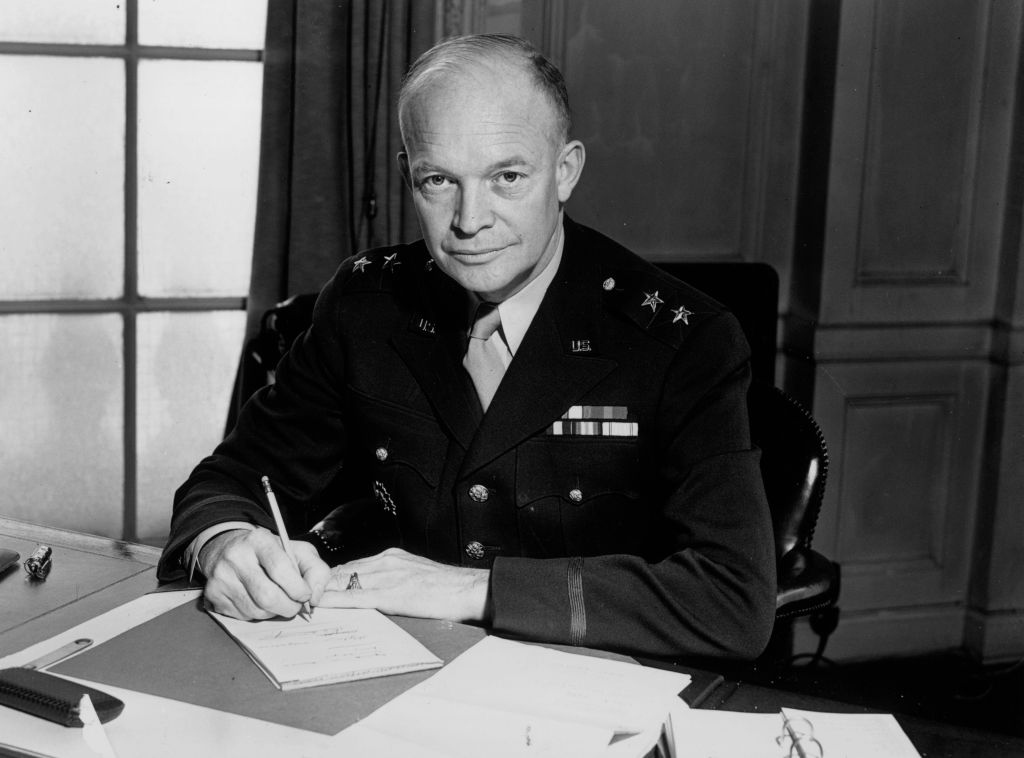
Donald Trump’s victory in November 2024 continued a more than three-decade trend: not since George H.W. Bush’s victory in 1988 had Americans chosen a combat veteran to be their commander-in-chief. Many of our recent Presidents, in fact, did not serve in combat. Bill Clinton controversially avoided the draft. George W. Bush served in the Texas National Guard when the Guard was a place for the rich and well-connected to avoid Vietnam. And while Barack Obama was just 12 years old when the Vietnam War draft ended, Donald Trump received four student deferments and a medical-leave deferment for bone spurs to avoid fighting in Vietnam. Similarly, Joe Biden received five education-related deferments and a medical exemption to help him avoid war.
[time-brightcove not-tgx=”true”]
While some Americans may no longer view military service as a prerequisite for the presidency, it’s important to understand how this attitude is a departure from the past, when wartime experiences shaped the personality and character of those in the White House. John F. Kennedy spoke for his generation when he said, “The war made us. It was and is our single greatest moment. The memory of the war is key to our characters. It serves as a break wall between the indolence of our youths and the earnestness of our manhood.” The war created a bond that could transcend political differences and convince future Presidents that the United States needed to play a vital role in world affairs.
For 36 years, beginning in 1953, every President from Dwight Eisenhower to George H. W. Bush (except for Ronald Reagan, who spent World War II making wartime propaganda films in Hollywood) had been in uniform during World War II. Jimmy Carter, who graduated from the Naval Academy in 1946, missed the war but served on a submarine in the early days of the Cold War.
These veteran Presidents demonstrated enormous personal courage. Instead of using their privilege to avoid service like some later Presidents, they used it to get closer to the battlefield. A mixture of patriotism and maybe even political calculation prompted their determination to get as close to the front lines as possible. For generations, service in the war would be a prerequisite to winning election to office.
Read More: Trump’s Support Among Military Voters Is Tanking
Kennedy, who failed the physical for both the Army and Navy, leaned on his father, former U.S. Ambassador to England Joseph P. Kennedy, to get him accepted in the Navy. But the younger Kennedy did not stop there. He then used connections to get assigned to combat in the Pacific. In addition to patriotic fervor, it is possible that sibling rivalry also motivated Kennedy. In their intensively competitive family, Jack wanted to keep up with his older brother, Joseph Kennedy Jr., who left Harvard Law School in June 1941 and was commissioned an ensign the following year.
Richard Nixon was ensconced in a comfortable position at the Office of Price Administration, which exempted him from the draft and yet he enlisted anyway. Much like Kennedy, he lobbied to get assigned to the Pacific. Nixon was already planning a career in politics and realized it would be difficult to explain to voters that he had remained Stateside while Americans risked their lives in combat. Gerald Ford, who had been a committed isolationist until Pearl Harbor, switched overnight to being an ardent internationalist and enlisted in the Navy in April 1942. Although he was already active in Republican politics and planned to run for office, politics did not notably influence his decision to enlist. Like so many others of his generation, he was driven by a strong sense of patriotism and felt compelled to contribute to the war effort.
George H. W. Bush, the scion of a wealthy and well-connected Connecticut family, could easily have avoided the war, but instead he enlisted in the Navy on his 18th birthday. Signing up to fight was a family tradition. He knew that his father had enlisted and fought on the front lines during World War I. Now it was his turn. For Bush the world changed on December 7, 1941. “After Pearl Harbor, it was a different world altogether,” he recalled. “It was a red, white, and blue thing. Your country’s attacked, you’d better get in there and try to help.”
For all of their differences in personality and politics, the Presidents who served in World War II learned the same lesson from their experience. Having seen the horrors of war they wanted to avoid the diplomatic mistakes that caused it. Their reference point was Neville Chamberlain’s futile 1938 effort to appease Hitler at an infamous conference in Munich. The “lessons of Munich” taught this generation that appeasement only led to greater sacrifice down the road.
It also made them miscalculate global challenges and led directly to America’s misadventure in Vietnam. Each of the Presidents who supported America’s involvement in Vietnam—which included Eisenhower, Kennedy, Johnson, Nixon, and Ford—understood the challenges of winning a war in the jungles of Southeast Asia. Even then, they felt compelled by the “lessons of Munich” to prevent a longer-term communist victory.
Read More: Why 1984’s Red Dawn Still Matters
The failures of the Vietnam War once again challenged many of the assumptions these men had learned from World War II. A younger generation of American Presidents who never served and who had no memory of Munich or actual combat experience articulated an alternative worldview that highlighted the limits of American power and challenged the belief in a monolithic international communist conspiracy. Yet many stressed the importance of international cooperation and using “soft power” to achieve foreign-policy objectives. The one exception was George W. Bush, who, riding a surge of patriotism and fear following 9/11, attempted to overthrow the Taliban in Afghanistan and waged a foolhearted war in Iraq. Neither war ended well, instead souring the public even more about American adventurism.

President Trump is unlike his predecessors, however. Unlike the World War II generation, Trump possessed no overarching—if simplistic—framework for his foreign policy. Unlike post-Vietnam Presidents, Trump has also abandoned internationalism for a crude form of unilateralism and has substituted personal grievance for national strategy. During his first term in office, he threatened North Korean leader Kim Jong Un, calling him “Little Rocket Man,” but later gushed over him as the two men exchanged “love letters.” Trump has engaged in the same pattern since the November election. He pledged once again to be an “America First” President, and to end unpopular conflicts in Gaza and Ukraine. Even so, during the interregnum, Trump boasted about making Canada the 51st state and leaving open the possibility of using military force to acquire Greenland and the Panama Canal.
His presidency represents a dramatic departure from the way that Presidents since World War II— both those who fought and those who did not—have viewed America’s role in the world. Despite their differences, those who served as commander-in-chief in the post-World War II era understood the importance of establishing strategic priorities based on American interests. The U.S. is entering uncharted waters led by an impulsive leader with no appreciation for the past or for the conventional rules of diplomacy.
Steven Gillon is author of Presidents at War: How World War II Shaped a Generation of Presidents, from Eisenhower and JFK through Reagan and Bush and a senior fellow at the Miller Center at the University of Virginia.
Made by History takes readers beyond the headlines with articles written and edited by professional historians. Learn more about Made by History at TIME here. Opinions expressed do not necessarily reflect the views of TIME editors.



